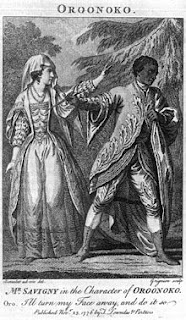The Prentend Anti-slaver.
Pro-slavery or Anti-slavery
Oroonoko: Or, The Royal Slave
 In
the story Oroonoko, the author Aphra Behn is proud of herself for
writing such an amazing anti-slave novel that comes from her own personal
life experiences. However, was this really anti-slave? Throughout the story, she
constantly shows how there is a clear difference between Oroonoko and white
people as she quickly points out that he has many desirable traits but is
black. The story in itself shows all of the horrors of the slave trade and how
millions of slaves were kidnapped from their homes and forced into slavery. One
could say that the fact that Oroonoko was royalty is just an example of how any
African could be a slave and their social status means nothing. This brings up
the question, was Behn against slavery or how slaves were treated?
In
the story Oroonoko, the author Aphra Behn is proud of herself for
writing such an amazing anti-slave novel that comes from her own personal
life experiences. However, was this really anti-slave? Throughout the story, she
constantly shows how there is a clear difference between Oroonoko and white
people as she quickly points out that he has many desirable traits but is
black. The story in itself shows all of the horrors of the slave trade and how
millions of slaves were kidnapped from their homes and forced into slavery. One
could say that the fact that Oroonoko was royalty is just an example of how any
African could be a slave and their social status means nothing. This brings up
the question, was Behn against slavery or how slaves were treated?
She goes into great detail about how badly slaves are treated or killed by the example of Oroonoko’s death however she writes the story in favor of the slave owners winning in the end. Why not let Oroonoko escape back home and have a happy ending? I believe the answer is simple Behn never truly wrote Oroonoko as a captured prince but as a superior slave named Caesar.
However, I must say that to live in the 17 century and to write a story outlining the horrors of the trade would shed some light on the terrors taking place in the trade. This does suggest that Behn was
anti-slavery but I personally believe that the book as good as the attention, she wrote it only because of her attraction to Oroonoko physically. She describes Oroonoko as a combination of African and European Roaman standards of masculinity, beauty, and nobility. More importantly, she loved the story of Oroonoko. A captured prince forced into slavery. One could ask if the same attention would be given to someone, not of nobility? There was always a clear difference between Oroonoko and the other slaves as Oroonoko had special privileges and was typically not treated as a common slave. I believe this served as two different facts. One Behn wanted to show a clear difference between a Nobel slave and a common one. Two and the most important was that her story was a warning to other slave owners that no matter how well you treat a slave they will still revolt and try to escape.
While reviewing "Captains and Slaves - Aphra Behn and the Rhetoric of Republic," I came to the understanding that this story had many qualities of an anti-slavery however, those qualities are bias to the writer who only wanted to write a love story. Her feelings towards slavery are reflected in what she inevitably does to her characters. That is they are both brutally killed and are made examples of. If Behn was anti-slavery she would have said something or possibly wrote a different ending. This brought me to my conclusion of the story was not anti-slavery but a warning of how slave masters should treat their slaves and how slaves can never be trusted.
I personally do not understand how people could ever treat another human being with such cruelty. The argument of it was a different time or slaves were not viewed as people during that time is false or just excuses made by the inflicters. After all long before the African slave trade became what it was Europeans used Irish slaves in the same way but recognized them as people. So why not Africans too? Unless of course, it is easier to converse large numbers of people that what is being done to these people is not as bad as it seems because after all, they are not human but slaves.
Sources:
Nestvold, Ruth. "The Aphra Behn Page." The Literary Research Award. 1995. http://www.lit-arts.net/Behn/racism.htm
Todd, Janet. "Oroonoko: Historical and political contexts." British Library. 2018. https://www.bl.uk/restoration-18th-century-literature/articles/oroonoko-historical-and-political-contexts#:~:text=Aphra%20Behn's%20tragic%20novella,a%20sentimental%20anti%2Dslavery%20tale.





This was great. You provided ample amount of evidence to back your claim and gave clear examples. I personally like how you simplified the issue as Aphra Behn merely viewing Oroonoko as an elevated slave. It puts it in perspective over the Hobbes and Locke debate about the issue over slavery. I agree, Aphra Behn would've only taken issue with Oroonoko due to his status not reflecting the treatment. This kinda supports and contradicts Locke, but he contradicts himself as well by justifying slavery under a 'just war'. Much like how Oronooko viewed it and how Aphra Behn expressed it.
ReplyDeleteWas A. Behn against slavery, or merely against how slaves were treated? Or, further to the point, was she only against how a person of high standards e.g. royalty, was being treated? Great points Jackson! I do want to add that not all Africans were 'kidnapped' but many were sold by other Africans (even Oroonoko.) And thank you for bringing up the Irish. I am of Irish decent, and through studies for out that African slaves were worth more than the Irish were. Humans commit horrible attocities toward one another, and I agree that there is never an justification for such acts. Great job!
ReplyDelete